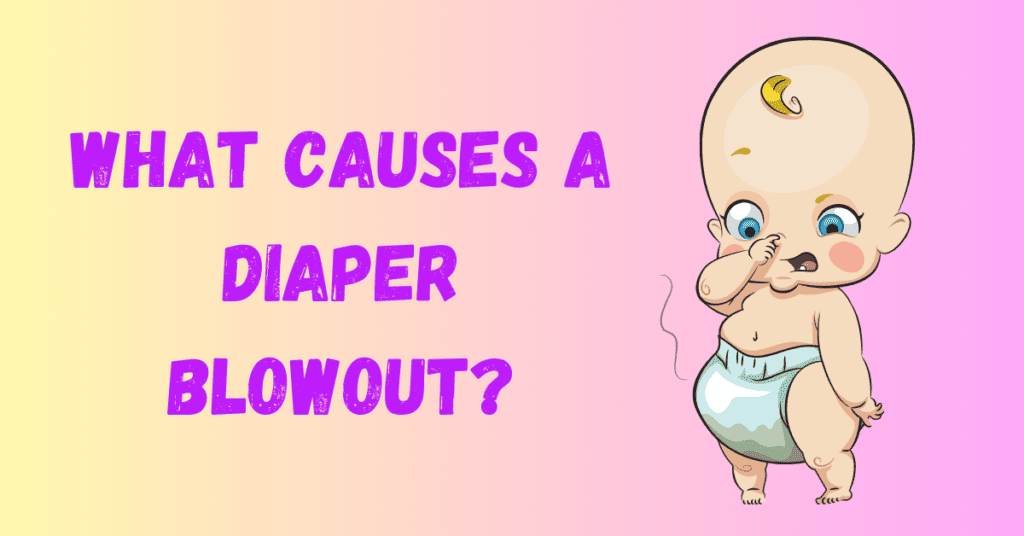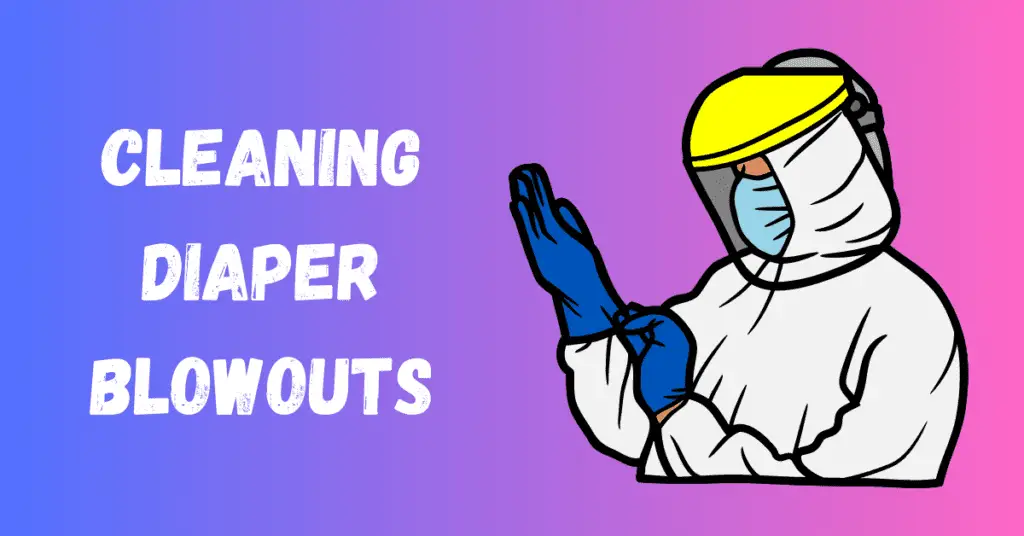Parenthood is a journey filled with laughter, joy, sleepless nights, and, of course, diaper blowouts. This messy phenomenon is something most parents have experienced at least once, and for some, it’s a recurring theme in their lives. If you’re lucky enough to have avoided this messy milestone thus far, consider this your crash course in all things diaper blowout-related.
In this guide, we’ll dive into the nitty-gritty details of diaper blowouts, including what they are, their causes, how to avoid them, and the best cleanup methods. So strap in, and let’s dive into the wild, wacky, and (sometimes) wonderful world of diaper blowouts.
What is a Diaper Blowout?
A diaper blowout is a situation where a baby’s poop escapes the confines of the diaper, often resulting in soiled clothing, bedding, and furniture. This not-so-pleasant event can happen at the most inconvenient times, like during a long car ride, at a family gathering, or in the middle of the night. Diaper blowouts can be caused by various factors, which we’ll explore in the next section.

What Causes a Diaper Blowout?
Many a parent has spent messy mornings wondering, why does my baby have diaper blowouts?!?! There are several reasons why diaper blowouts can occur. Understanding these causes can help you take preventative measures to minimize the chances of facing such a messy situation.
Diaper Size
Finding the right diaper size for your baby is essential. Diapers that are too big can be loose and prone to leaks, while diapers that are too small can be overstretched and unable to contain the mess. The perfect fit is snug around your baby’s bottom and thighs without being too tight.
Poor Fitting Diapers
As babies become more mobile, their diapers can shift out of place. Crawling, rolling, and wiggling can cause the diaper to move, creating gaps and opportunities for a blowout to occur.
If you need some advice on finding the right diaper – check out our best diapers in Canada article as well.
Overstuffing the Diaper
Some parents might think that adding extra absorbent layers to a diaper can help prevent blowouts. However, overstuffing can actually compromise the diaper’s fit and make it more susceptible to leaks.
Transitioning to Solid Foods
When babies transition to solid foods, their digestive systems need time to adjust. This can lead to changes in the consistency of their poop, making it more difficult for diapers to contain the mess.
The Diaper Defier
Some babies seem to have a knack for causing diaper blowouts, no matter how carefully the diaper is secured. These diaper Houdinis can make even the most attentive parent question their sanity.
Free baby stuff for you to claim for your baby! Sign up to get the PDF with all the links.
How to Avoid Diaper Blowouts
While it may not be possible to prevent every diaper blowout, there are steps you can take to minimize their frequency and severity.
Find the Right Fit
Experiment with different diaper sizes and brands to find the best fit for your baby. Each baby is unique, so don’t be afraid to try a few options before settling on the right one.
Master the Art of Securing
Properly securing the diaper is crucial for preventing blowouts. Make sure the leg cuffs are snug but not too tight, and the waistband is secure without digging into your baby’s skin.
Change It Up
Regular diaper changes can help reduce the risk of blowouts. Keep an eye on the clock and your baby’s telltale signs to determine when it’s time for a fresh diaper.
The Layering Technique
If your baby is prone to blowouts, consider using a diaper cover or an extra layer of protection. While this may not prevent the blowout entirely, it can help contain the mess and potentially save your baby’s wardrobe and your sanity.
Embrace the Learning Curve
Monitor your baby’s digestive patterns as they transition to solid foods. This may help you anticipate when a blowout is most likely to occur and take preemptive measures to minimize the mess.
Accept the Inevitable
Sometimes, despite your best efforts, diaper blowouts will happen. Accepting this fact can help you maintain a sense of humour and perspective as you navigate the messy world of parenthood.
So just how much are diapers costing in Canada these days? We have an article for that.
How to Clean Up a Diaper Blowout
When faced with a diaper blowout, it’s essential to have a plan of action for efficient and thorough cleanup. Follow these steps to tackle the mess head-on:
- Assess the Situation: Before diving into the cleanup, take a moment to assess the damage. This can help you determine what supplies you’ll need and the best course of action for cleaning up the mess.
- Gather Your Supplies: Arm yourself with the necessary tools for battle, including disposable gloves, baby wipes, a clean diaper, a change of clothes for your baby, plastic bags for soiled items, and a surface protector for your changing area.
- Remove the Diaper: Carefully unfasten the diaper tabs, folding the diaper inward to contain as much of the mess as possible. Dispose of the soiled diaper in a plastic bag to contain the smell and prevent further mess.
- Wipe It Down: Using baby wipes, gently clean your baby’s bottom and surrounding areas, working from front to back. Be sure to get into any folds and creases where mess might be hiding.
- Apply Diaper Cream (Optional): If your baby has sensitive skin or is prone to diaper rash, apply a layer of diaper cream to create a barrier between their skin and the fresh diaper.
- Secure a Fresh Diaper: Put on a clean diaper, making sure to secure it snugly around your baby’s waist and thighs. Double-check that the leg cuffs are properly positioned to prevent leaks.
- Change Baby’s Clothes: Remove any soiled clothing, being careful not to spread the mess further. Dress your baby in a fresh set of clothes and place the dirty clothes in a plastic bag for laundering later.
- Clean Up Your Workspace: Dispose of any used wipes and diapers, and sanitize your changing area to prevent the spread of germs.
- Wash Your Hands: Thoroughly wash your hands with soap and water to ensure cleanliness and prevent the spread of bacteria.

Additional Tips for Handling Diaper Blowouts
In addition to the steps outlined above, consider these extra tips to make handling diaper blowouts a little easier:
- Keep a Diaper Blowout Kit on Hand: Create a portable kit containing all the supplies you’ll need for a diaper blowout cleanup. This can include gloves, wipes, a change of clothes, a clean diaper, and plastic bags. Having everything in one place can help streamline the cleanup process.
- Invest in Easy-to-Clean Baby Gear: Opt for baby gear that’s easy to wipe down or machine washable. This can make cleaning up after a blowout a little less daunting.
- Share the Load: If you have a partner, take turns handling diaper blowouts. This can help prevent burnout and maintain a sense of teamwork as you navigate the challenges of parenthood together.
- Keep Your Sense of Humour: Diaper blowouts can be messy and frustrating, but it’s important to maintain a sense of humour. Laughing at the situation can help alleviate stress and remind you that these messy moments are just a small part of the joyous journey of parenthood.
Diaper Blowouts Along the Leg
A diaper blowout along the leg is another common issue, and like the back blowout, it is often due to a poor fit or a too-full diaper. Here’s how to prevent and deal with this issue:
- Proper Diaper Fit: The leg cuffs of the diaper should be snug but not tight. Make sure the leg cuffs are not tucked in, as this can cause leaks. They should be fanned out around your baby’s thighs to create a good seal.
- Correct Diaper Size: Using a diaper that’s too large for your baby may leave gaps around the leg area. On the other hand, a too-small diaper won’t provide adequate coverage. It’s essential to choose a diaper that fits your baby well.
- Frequent Changes: Change the diaper often to prevent it from getting too full. A diaper that’s saturated with urine is more likely to leak when your baby poops.
- Try Different Diaper Brands: If you’re experiencing regular blowouts along the leg, it could be worth trying a different brand. Some diapers are better designed to prevent leaks in this area.
- Consider Using Diaper Covers: Diaper covers add an extra layer of protection and can help prevent leaks along the leg. They come in a variety of styles and materials, such as wool, PUL (polyurethane laminate), or fleece.
Remember, dealing with diaper blowouts is a common part of parenting. With a little patience, the right products, and proper techniques, you can significantly reduce the chances of these messy occurrences.
Baby Poop Leaking Out the Back of the Diaper
One of the most common problems new parents face is the infamous diaper blowout, and when it happens at the back, it can become even more of a challenge. Baby poop leaking out the back of the diaper is often a sign of an improper fit, a too-full diaper, or incorrect positioning. Here’s how to handle this predicament:
- Check the Size: The first thing to look at is the size of the diaper. If it’s too small, the diaper won’t be able to contain everything, leading to leaks. Similarly, a diaper that is too large will have gaps for leaks to escape. The right-sized diaper should fit snuggly around your baby’s waist and thighs without causing red marks or indentations.
- Ensure Proper Positioning: The back waistband of the diaper should be higher than the front. Make sure the diaper is centred and pulled up high enough in the back to prevent blowouts.
- Change Frequently: The fuller a diaper is, the more likely it is to leak. Changing your baby’s diaper frequently can help prevent blowouts at the back. It’s especially important to change the diaper immediately after a poop.
- Consider Double Diapering: In cases of frequent blowouts, double diapering might be a good idea. This involves using two diapers, one over the other, to provide an extra layer of protection.
- Experiment with Different Brands: Not all diapers are made equally. You might find that certain brands fit better on your baby and do a better job at containing leaks.
Are Diaper Blowouts Diarrhea?
It’s important to distinguish between diaper blowouts and diarrhea. While both can be messy, they are not the same thing.
A diaper blowout is simply when the contents of a diaper, which could be solid, semi-solid, or liquid stool, escape from the diaper. This could be due to a variety of reasons, like an ill-fitting diaper, infrequent diaper changes, or vigorous activity.
Diarrhea, on the other hand, is a medical condition characterized by loose or watery stools that occur more frequently than normal. In babies, it can be caused by a variety of factors, including infections, food intolerance, or a reaction to medication.
Diarrhea can lead to diaper blowouts because of the increased frequency and liquid content of the stools, but not all diaper blowouts are caused by diarrhea.
If your baby is having frequent loose or watery stools, it’s important to consult a healthcare provider to rule out any medical conditions. Dehydration is a risk with diarrhea, especially in babies, so make sure your baby is taking in enough fluids and consult a healthcare provider if you’re concerned.
Conclusion
Diaper blowouts are an inevitable part of raising a baby, but with a little preparation and a healthy dose of humour, they don’t have to be the bane of your existence. By understanding the causes of diaper blowouts, taking steps to avoid them, and mastering the art of cleanup, you can face these messy challenges with confidence and grace.
Remember, you’re not alone in this messy journey. Parents all over the world have faced diaper blowouts and come out the other side with a story to tell and a chuckle to share. So, keep your chin up, your nose plugs handy, and embrace the wild, wonderful, and occasionally messy world of parenting. After all, one day, you’ll look back on these blowout battles with a smile, knowing you survived the trenches of diaper duty and came out stronger for it.

